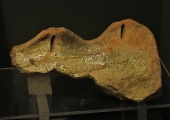The Museum Collection: Medieval
Bradford on Avon Museum, Wiltshire
.
Although whole buildings of the middle ages stand in and around Bradford, so far very little from the medieval period has come to Bradford on Avon Museum. Less than from the New Stone Age (Neolithic ) and much less than from the Roman Period!
.
 The figure of a medieval lion carved in limestone that was found in rubble in the Thai Barn restaurant in St Margaret’s Street. It is not known why it was there.
The figure of a medieval lion carved in limestone that was found in rubble in the Thai Barn restaurant in St Margaret’s Street. It is not known why it was there.
.
.
 This piece of stone is a part of a hone that was used for sharpening knives and perhaps sickles. It was probably thrown away when it broke from having been worn by a lot of use. It is made of a hard metamorphic rock that is typical of honestones that were traded from Norway by Vikings, especially along the coasts of the Irish Sea and to the Bristol Channel.
This piece of stone is a part of a hone that was used for sharpening knives and perhaps sickles. It was probably thrown away when it broke from having been worn by a lot of use. It is made of a hard metamorphic rock that is typical of honestones that were traded from Norway by Vikings, especially along the coasts of the Irish Sea and to the Bristol Channel.
.
.
 The Museum has a few small scraps of medieval pottery, which was mostly coarse and not as well made as Roman, so did not survive as well. The best pots were often decorated with patterns that were cut into the clay and coated with a thick greenish glaze to make them waterproof. This scrap, from Budbury in Bradford, may have been from a jug that was made at Ham Green, between Bristol and Portishead.
The Museum has a few small scraps of medieval pottery, which was mostly coarse and not as well made as Roman, so did not survive as well. The best pots were often decorated with patterns that were cut into the clay and coated with a thick greenish glaze to make them waterproof. This scrap, from Budbury in Bradford, may have been from a jug that was made at Ham Green, between Bristol and Portishead.
 A sherd of a pot with a thin yellowish glaze and combed zigzag decoration around the inside of the rim. It was made in the 13th century at Minety in north Wiltshire and found on the Tory hillside in Bradford on Avon.
A sherd of a pot with a thin yellowish glaze and combed zigzag decoration around the inside of the rim. It was made in the 13th century at Minety in north Wiltshire and found on the Tory hillside in Bradford on Avon.
.
.
 A broken medieval ridge tile that was found in excavations at Budbury Manor House in Bradford on Avon. Tiles like this lined the ridge of the roof of a building and characteristically were covered with a thin yellowish glaze and had a wavy top that was pierced by knife cuts.
A broken medieval ridge tile that was found in excavations at Budbury Manor House in Bradford on Avon. Tiles like this lined the ridge of the roof of a building and characteristically were covered with a thin yellowish glaze and had a wavy top that was pierced by knife cuts.

